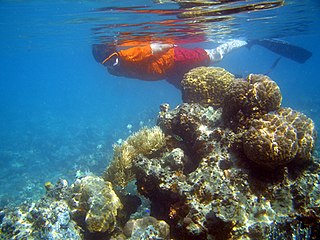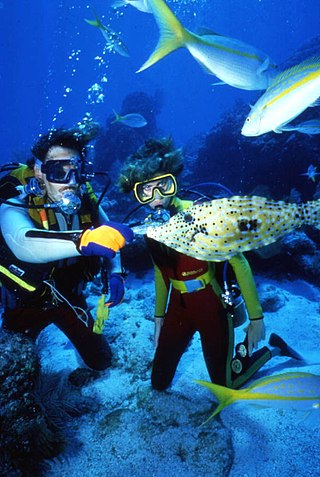Related Research Articles

Snorkeling is the practice of swimming on or through a body of water while equipped with a diving mask, a shaped breathing tube called a snorkel, and usually swimfins. In cooler waters, a wetsuit may also be worn. Use of this equipment allows the snorkeler to observe underwater attractions for extended periods with relatively little effort and to breathe while face-down at the surface.

Freediving, free-diving, free diving, breath-hold diving, or skin diving is a form of underwater diving that relies on breath-holding until resurfacing rather than the use of breathing apparatus such as scuba gear.

Spearfishing is a method of fishing that involves impaling the fish with a straight pointed object such as a spear, gig or harpoon. It has been deployed in artisanal fishing throughout the world for millennia. Early civilisations were familiar with the custom of spearing fish from rivers and streams using sharpened sticks.

Diving activities are the things people do while diving underwater. People may dive for various reasons, both personal and professional. While a newly qualified recreational diver may dive purely for the experience of diving, most divers have some additional reason for being underwater. Recreational diving is purely for enjoyment and has several specialisations and technical disciplines to provide more scope for varied activities for which specialist training can be offered, such as cave diving, wreck diving, ice diving and deep diving. Several underwater sports are available for exercise and competition.

Recreational diving or sport diving is diving for the purpose of leisure and enjoyment, usually when using scuba equipment. The term "recreational diving" may also be used in contradistinction to "technical diving", a more demanding aspect of recreational diving which requires more training and experience to develop the competence to reliably manage more complex equipment in the more hazardous conditions associated with the disciplines. Breath-hold diving for recreation also fits into the broader scope of the term, but this article covers the commonly used meaning of scuba diving for recreational purposes, where the diver is not constrained from making a direct near-vertical ascent to the surface at any point during the dive, and risk is considered low.
Scuba Schools International (SSI) is a for-profit organization that teaches the skills involved in scuba diving and freediving, and supports dive businesses and resorts. SSI has over 2,500 authorized dealers, 35 regional centers, and offices all over the world.

John Pennekamp Coral Reef State Park is a Florida State Park located on Key Largo in Florida. It includes approximately 70 nautical square miles (240 km²) of adjacent Atlantic Ocean waters. The park is approximately 25 miles in length and extends 3 miles into the Atlantic Ocean. It was the first underwater park in the United States. The park was added to the National Register of Historic Places on April 14, 1972. The primary attractions of the park are the coral reefs and their associated marine life.

Shark tourism is a form of eco-tourism that allows people to dive with sharks in their natural environment. This benefits local shark populations by educating tourists and through funds raised by the shark tourism industry. Communities that previously relied on shark finning to make their livelihoods are able to make a larger profit from diving tours while protecting the local environment. People can get close to the sharks by free- or scuba diving or by entering the water in a protective cage for more aggressive species. Many of these dives are done by private companies and are often baited to ensure shark sightings, a practice which is highly controversial and under review in many areas.
Performance Freediving International (PFI) is a freediving training agency founded in 2000 by Kirk Krack. Krack coached World Champion Freedivers, Mandy-Rae Cruickshank and Martin Stepanek. PFI teaches freediving clinics around the world and is involved in both team and athlete development. Since 2004, PFI has hosted DejaBlue, which is an international freediving competition. In July 2019, PFI was purchased by International Training, the owner of companies including Scuba Diving International and Technical Diving International.

The Maldives, officially the Republic of Maldives, is a small archipelagic state in South Asia. It lies in the Indian Ocean southwest of Sri Lanka and India, about 700 kilometres (430 mi) from the Asian continent's mainland. The chain of 26 atolls stretches across the Equator from Ihavandhippolhu Atoll in the north to Addu Atoll in the south. The land area is roughly 298 square kilometres. Malé is the capital.

Green Fins is an approach to sustainable marine tourism activities operating in South East Asia, Caribbean and the Indian Ocean that works with business operators, communities and governments. It helps to implement environmental standards for the diving and snorkelling industry through a code of conduct. The overall aim of the initiative is to mitigate damaging impacts to the marine environment from the marine tourism sector and improve sustainability. The code of conduct is a set of 15 points designed to tackle the most common and detrimental effects of SCUBA diving and snorkelling activities on the habitat in which they operate.

The Cancún Underwater Museum is a non-profit organization based in Cancún, Mexico devoted to the art of conservation. The museum has a total of 500 sculptures, by a series of international and local sculptors, with three different galleries submerged between three and six meters deep in the ocean at the Cancún National Marine Park. The museum was thought up by Marine Park Director Jaime González Cano, with the objective of saving the nearby coral reefs by providing an alternative destination for divers. It was started in 2009 and officially opened in November 2010.

Bob Halstead, has made significant contributions to the sport of scuba diving in a multitude of capacities: photographer, author of eight diving books, early innovator in the development of dive tourism, pioneer in the dive liveaboard industry, diving instructor and educator, marine-life explorer and influential diving industry commentator. An ardent diver since 1968, Halstead has over 10,000 logged dives.

Recreational dive sites are specific places that recreational scuba divers go to enjoy the underwater environment or for training purposes. They include technical diving sites beyond the range generally accepted for recreational diving. In this context all diving done for recreational purposes is included. Professional diving tends to be done where the job is, and with the exception of diver training and leading groups of recreational divers, does not generally occur at specific sites chosen for their easy access, pleasant conditions or interesting features.

Tourism is one of the major industries in the Great Barrier Reef region. Approximately five million people visit the Great Barrier Reef each year. According to the WWF, tourism of the area contributes $5.4 billion a year to the Australian economy, and employs approximately 69,000 people. Ove Hoegh-Guldberg sees the key competitive advantage of the Great Barrier Reef as opposed to other, closer, reef tourism destinations is the region's reputation as being "the most pristine coral reef on the planet". The GBRMPA states that careful management, which includes permits for camping and all commercial marine tourism within the Great Barrier Reef Marine Park, has so far ensured that tourists have a very minimal impact on the reef.

The Rebreather Association of International Divers (RAID) is a dive training organization which was founded in 2007 by Barry Coleman to support diver training for the Poseidon Mk VI Discovery Rebreather. It has since extended its scope to include open circuit scuba training and training for both recreational and technical diving sectors as well as snorkeling and freediving.
Scuba diving tourism is the industry based on servicing the requirements of recreational divers at destinations other than where they live. It includes aspects of training, equipment sales, rental and service, guided experiences and environmental tourism.

The environmental impact of recreational diving is the effects of recreational scuba diving on the underwater environment, which is largely the effects of diving tourism on the marine environment. It is not uncommon for highly trafficked dive destinations to have more adverse effects with visible signs of diving's negative impacts due in large part to divers who have not been trained to sufficient competence in the skills required for the local environment, an inadequate pre-dive orientation, or lack of a basic understanding of biodiversity and the delicate balance of aquatic ecosystems. There may also be indirect positive effects as the environment is recognised by the local communities to be worth more in good condition than degraded by inappropriate use, and conservation efforts get support from dive communities who promote environmental awareness, and teach low impact diving and the importance of respecting marine life. There are also global coral reef monitoring networks in place which include local volunteer divers assisting in the collection of data for scientific monitoring of coral reef systems, which may eventually have a net positive impact on the environment.
Low impact diving is recreational scuba diving that is intended to minimise environmental impact by using techniques and procedures that reduce the adverse effects on the environment to the minimum that is reasonably practicable for the situation. To a large extent this is achieved by avoiding contact with sensitive reef life, but it also applies to diving on historical wrecks and in caves with delicate rock formations. It is in the interests of diving tourism service providers to help protect the condition of the dive sites on which their businesses rely. They can contribute by encouraging and teaching low impact diving and following best-practice procedures for diving in sensitive areas. Low impact diving training has been shown to be effective in reducing diver contact with the bottom, the most common cause of reef damage.
References
- ↑ May, Kevin (June 8, 2012). "Ocean heaven as TangaReef brings bookings and reviews to diving trips". Phocuswire.
- ↑ Andersson, Greg (June 8, 2012). "TangaReef Gets Dive Centers Online for World Oceans Day". Coral Reef Alliance.
- ↑ Arvonen, Päivi (August 17, 2012). "TangaReef offers divers a booking service and helps to save the seas". Enterprise Helsinki. Archived from the original on November 20, 2012. Retrieved January 20, 2013.
- ↑ "Slush-tapahtuman finalistit selvillä". Kauppalehti. October 3, 2011. Retrieved January 20, 2013.
- ↑ "Associate Members". Association of Finnish Travel Agents (AFTA). Archived from the original on April 12, 2013. Retrieved February 6, 2013.
- ↑ Pasolini, Antonio (June 21, 2012). "TangaReef dives into sustainability". Justmeans. Retrieved January 20, 2013.